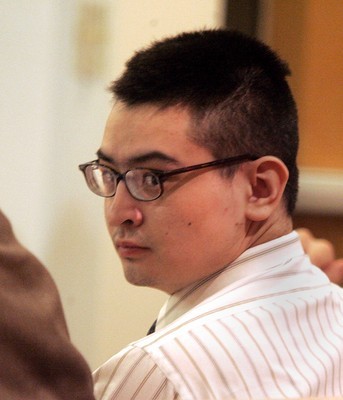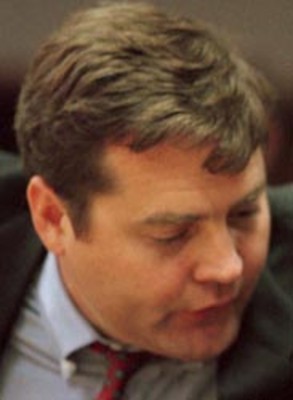John’s Law gives mom some peace
Robbin Trowbridge Benko is delighted that her son's killer has a road map to freedom.
She won't be happy to see 24-year-old Michael Kane return to the streets. But after years of advocating for changes to Nevada's insanity defense laws, Benko finally saw passage of her bill in the last legislative session.
The law, which takes effect today, is expected to result in court supervision of Kane when he gets out of the state's facility for mentally ill offenders.
"This is going to make sure he is ready for society and society is ready for him," Benko, 45, said from her home in Chesterton, Ind.
Kane was charged with murder for killing Benko's son, 23-year-old John Trowbridge.
After taking the hallucinogen LSD, Kane repeatedly plunged an 8-inch dagger into Trowbridge during a video game session with friends. In September 2004, a jury found Kane not guilty by reason of insanity.
Kane was sent to the state's Lake's Crossing Center in Sparks. Nine months later, doctors there determined that he was no longer mentally ill as defined under state law. That meant Kane was eligible for release. A person found not guilty by reason of insanity can be held at Lake's Crossing only until they are determined to be no longer mentally ill.
Prosecutors were able to prevent Kane's release by bringing in other doctors who said Kane was still mentally ill. Still, Benko was horrified that Kane came so close to winning unconditional freedom so quickly.
Benko graduated from law school but put off studying for the Bar exam while she pushed to change Nevada's law. She recalled the day she learned in Indiana that Kane might be released: She compiled a list of Nevada lawmakers and the next day called every one.
"My strategy was first to let every legislator know that the law was flawed, the effect it was going to have on my case and the effect of future cases; but the biggest part of the strategy was to let them know, I'm not going away," Benko said.
Benko, an academic adviser and case manager for at-risk children in addition to being the mother of two other sons, ages 21 and 27, made about 20 trips to Nevada during her quest, starting with Kane's court hearings.
The efforts "allowed me to actually gain some energy, focus my emotions and get me through the grieving process because I felt I was still working as a mother to John."
Benko initially was rebuffed by some lawmakers, who said they could do nothing to help her. But she found leverage in the minutes from the 2005 session during which lawmakers talked about re-examining the insanity defense law but decided it would affect few people and dropped it.
Benko said she took the minutes to those lawmakers during the 2006 election year and said, "I suggest you work with me or let it be known during election time ... a murderer may walk the streets because you did not want to look at rectifying your mistake."
Benko also stirred up as much media attention as she could, even getting interviewed on "Good Morning America," Court TV, CNN and "The Early Show" on CBS.
Clark County District Judge Jennifer Togliatti wound up delaying Kane's release, as policymakers worked on the legislation.
The legislation, nicknamed John's Law after Benko's son, provides the court with a way to release offenders such as Kane through programs created with the help of doctors from Lake's Crossing and members of the state's Division of Mental Health and Developmental Services.
The programs require a judge's approval. The law allows judges to impose conditions, which could be anything from medication and counseling requirements to regular meetings with a court-designated supervisor. If the offender fails to comply with the conditions, a judge can recommit the defendant to the custody of the state mental health division.
The law means that someone like Kane can't "simply show signs of improvement and be set free to walk the streets and do as he pleases," Benko said. "He will be accountable. He will answer to the courts."
"At this point," prosecutor Tim Fattig said, "the parties are at least working toward a conditional release at some point in the future where he's going to be monitored and have all sorts of conditions."
LAW FACES CHALLENGES
The new law is not without controversy and may be headed for a court challenge.
The American Civil Liberties Union of Nevada believes the conditional release offered under the law is unconstitutional.
If a person is acquitted, as is the case with a not guilty by reason of insanity verdict, and found to no longer pose a danger, as could be reasonably inferred from doctors declaring a person no longer insane, then the state has no authority to continue to hold that person against his will, the organization's lawyers say.
Scott Coffee, Kane's defense lawyer, however, said the conditional release program is a step most not-guilty-by-reason-of-insanity defendants will have to go through to be released.
"You can't tell how someone is going to swim unless you throw them in the water, and that's what the conditional release program does" with the benefit of supervision, Coffee said.
Another aspect of John's Law is it reintroduces the "guilty but mentally ill" verdict.
In 1995, the Nevada Legislature eliminated the not guilty by reason of insanity verdict, also known as the insanity defense, and replaced it with guilty but mentally ill. But in 2001, the Nevada Supreme Court ruled that defendants are entitled to have the option of an insanity defense.
The ruling set aside that period's version of guilty but mentally ill. From then until today , when the new law takes effect, the only plea and verdict that took insanity into consideration in Nevada was not guilty by reason of insanity.
To qualify for not guilty by reason of insanity, however, defendants must prove they were in a delusional state at the time of the crime and did not understand at the time that their actions were wrong. That's an extremely difficult standard to meet, defense lawyers and the ACLU of Nevada have long complained.
Now, they say, the few cases in which defendants might be able to prove insanity will likely wind up with guilty but mentally ill verdicts, because it will be a convenient option for jurors who want to see an offender punished regardless of state of mind.
"The essence of what has happened here is they (legislators) have created a guilty but mentally ill plea as a way to ensure no jury ever returns a not guilty by reason of insanity verdict," said Howard Brooks, a deputy public defender. "Juries hate the insanity defense."
Assemblyman William Horne, D-Las Vegas, authored the bill after Benko contacted him. As a defense attorney in Clark County, he received some criticism from colleagues for including the guilty but mentally ill aspect.
"They believe that as a knee-jerk response the jury is going to pick that," Horne said.
But it needed to be in the legislation, he said, because "without it, say in the Kane case, the jury can acquit when it shouldn't."
Benko said, "I do believe that if the jury had the option, they would have found Kane guilty but mentally ill. There was never a doubt as to who killed my son, but there was a doubt as to his mental health at the time of the crime."
GUILTY BUT MENTALLY ILL
A key difference between the two verdicts is that a defendant who is found guilty but mentally ill will be sent into the prison system instead of Lake's Crossing.
Defense attorney Lisa Rasmussen, president of Nevada Attorneys for Criminal Justice, said she fears defendants found guilty but mentally ill won't receive any additional treatment in prison. No funding was allocated for it.
Clark County Public Defender Phil Kohn recalled the first guilty but mentally ill defendant he represented, more than a decade ago. Kohn said he was shocked to learn the defendant, a paranoid schizophrenic, was placed within the general population at Ely State Prison.
Kohn said he thinks new Corrections Director Howard Skolnik will try to provide mental health treatment to inmates who should get it. However, given the track record of the prison system, Kohn and other defense lawyers are skeptical.
Supporters of the bill have countered that the guilty but mentally ill plea changes little and that the corrections department is already required to provide mental health treatment for inmates.
Under the new law, if a defendant is still mentally ill at the time of sentencing, the court is required to direct the Department of Corrections to provide any treatment prescribed for their disorder.
Another complication of the guilty but mentally ill verdict is the death penalty. Prosecutors can seek the execution of any defendant found guilty but mentally ill in a first-degree murder case.
The U.S. Supreme Court ruled in 2002 the execution of mentally retarded defendants violates the Eighth Amendment's ban on cruel and unusual punishment, but that did not eliminate death sentences for the mentally ill.
Prosecutor Ben Graham, who represented the Clark County district attorney's office in legislative discussions about the bill, said it is unlikely prosecutors would seek the death penalty for a defendant showing any signs of significant mental illness, unless prosecutors believe the defendant is putting on an act.
ANNUAL COURT HEARING
Under the new law, Kane is entitled to an annual hearing where a judge will evaluate him for release. That's another change. Under the old law, hearings were required every six months.
The plan is for Kane to start a "step down" program soon, taking the first moves toward his eventual conditional release. He has been in drug counseling once a week since spring.
Coffee said Kane was also hoping to soon be evaluated for vocational training.
"He's trying to get licensed as a physical fitness therapist. He's been taking some college classes at Lake's Crossing and got straight A's so far," Coffee said. "It's good stuff. Hopefully a success story."
Benko, likewise, hopes it is a success story.
"Since Oct. 22, 2001, when my son was brutally stabbed to death, I have tried to work through all my anger, hurt and emptiness in a positive manner. Knowing that I perpetuated and co-authored a new law, that my efforts were the catalyst for safety, helps the anger subside."
Oct. 1, the date of the enactment of John's Law, becomes the third significant day of the month for her. The dates of John Trowbridge's birth and death also fall in October.
Benko said that today she will "probably cry out of joy. It's bittersweet. I will try to remind myself this is a happy day and a happy occasion ... and that I'm still his mom."
LAW'S CHANGES "John's Law," which takes effect today, makes several changes regarding Nevada's judicial system. They include: Providing for court supervision of offenders found not guilty by reason of insanity after they are released from Lake's Crossing Center, the state's facility for mentally ill offenders. It gives the court a way to release offenders such as Michael Kane through programs created with the help of doctors from Lake's Crossing and members of the state's Division of Mental Health and Developmental Services. The programs require a judge's approval. The law allows judges to impose conditions, which could be anything from medication and counseling requirements to regular meetings with a court-designated supervisor. If the offender fails to comply with the conditions, a judge can recommit the defendant to the custody of the state mental health division. Under the old law, a person who was found not guilty by reason of insanity had to be released unconditionally from Lake's Crossing once they were determined to be no longer insane. Changes the time period for evaluation hearings for people in Lake's Crossing who have been found not guilty by reason of insanity. Under the new law, they are each entitled to an annual hearing in court where a judge will evaluate them for release. Under the old law, the hearings were required every six months. Reintroduces the option of "guilty but mentally ill" pleas and verdicts. A person who is found guilty but mentally ill will go into the prison system instead of Lake's Crossing. The prison system was already required to provide mental health treatment for inmates, but under the new law, if a defendant is still mentally ill at the time of sentencing, the court is also required to direct the Department of Corrections to provide any treatment prescribed for that person's disorder. REVIEW-JOURNAL




















